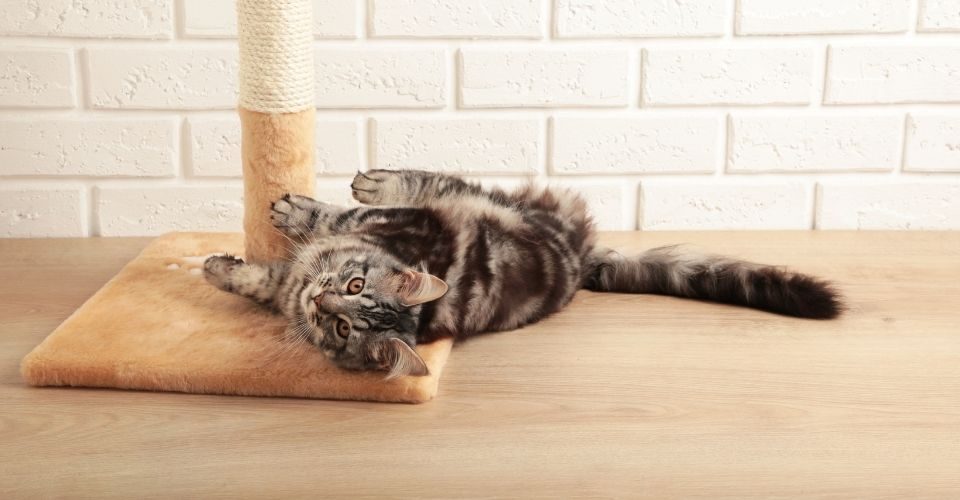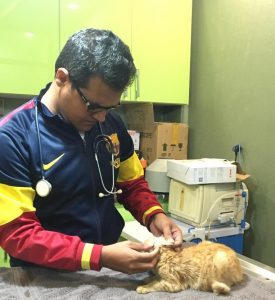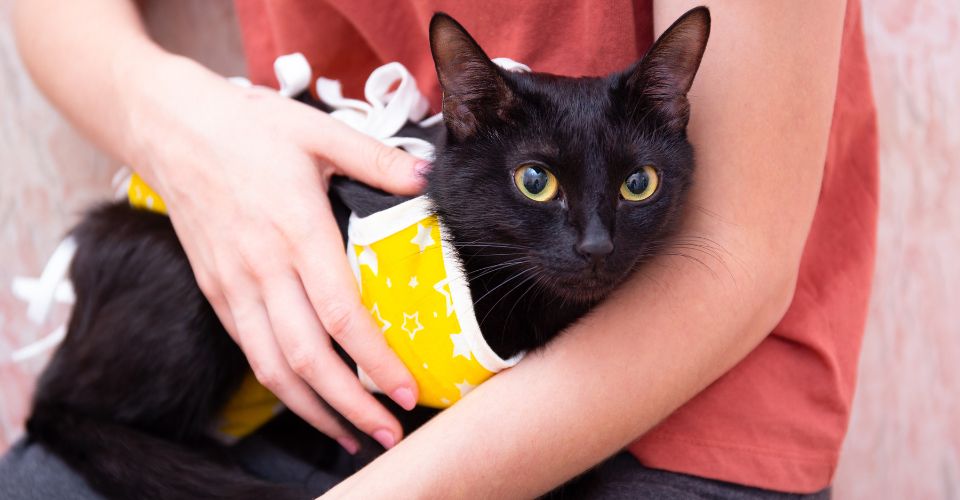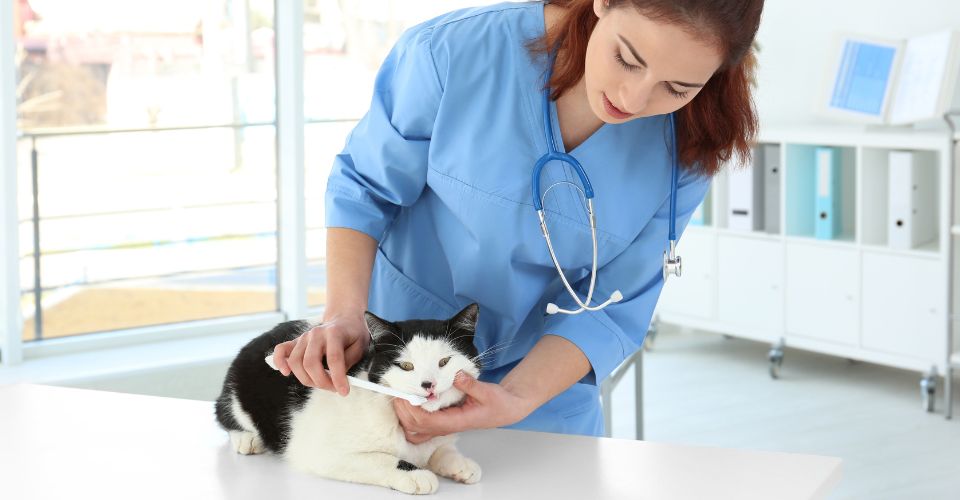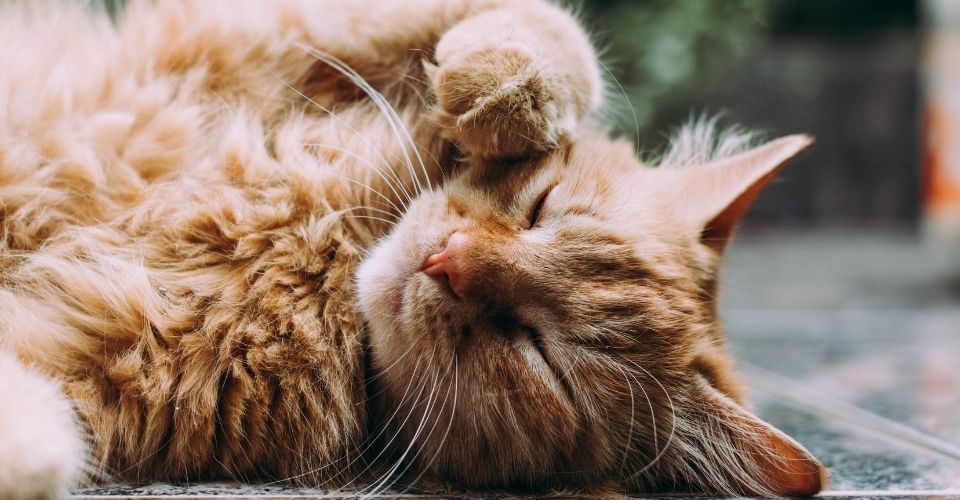Has your cat been scratching and itching like crazy? Has she been chewing her skin? Does she see seem restless all the time? Probably, pesky little critters—fleas and ticks—have been annoying your feline friend. Fleas on kittens is the worst nightmare of every cat owner.
Fleas suck the blood out of our cute little friends and make them itch and scratch. On top of that, the threat of fleas on cats jumping on humans in the house and spreading diseases like typhus and plague is pretty scary. Therefore, cat owners try—and must try—to get rid of fleas on kittens as early as they discover them.
Fleas on Kittens
Fleas on kittens are not just a nuisance; they are more than just an itch here and a scratch there. They not only make your cat’s life a living hell but a flea outbreak in your home, and the thought of cat fleas attacking you and other humans in the house can make your life miserable as well. Therefore, you are advised not to take fleas on kittens lightly. Instead, it would be best if you approached them aggressively.
How to Tell if Cat Has Fleas?
Watching a cat itching and licking herself, you may rush to a vet or some online pet store to get some flea medicine for cats. But before you do that, you should confirm if there are fleas on cats as cat itching and licking does not always mean that she has fleas. Cats are fastidious creatures, and she might just be doing the routine self-grooming.
Signs That There are Fleas on Kittens
Cats are stoic creatures. They don’t let others get a hint about their sickness. So you will have to be vigilant about the signs of sickness in cats. As far as the fleas are concerned, you need to look for the following signs:
- Cat itching and scratching excessively
- Cat shaking her head
- Cat licking her hair coat constantly
- Hair loss in certain areas due to excessive scratching
- Cat’s skin getting red and bumpy is also a sign that there are fleas on kittens.
Spotting Fleas on Kitten
- In severe cases, you would be able to spot fleas moving on your cat’s body
- In less severe cases, you may have to look for fleas in their favorite spots—armpits and groin
- Use a fine-toothed metal flea comb and comb your cat. The comb will remove adult fleas and their eggs from your kitten’s coat.
Now that you know your cat has fleas, you must be thinking of getting the best flea medicine for kittens available in the market. Or maybe, you start looking for home remedies for fleas on kittens. Whatever the case is, stick around as we are going to discuss all about fleas on kittens: What not to use on kittens to kill pesky fleas; some safe and effective home remedies for fleas on kittens; flea medicines for Kittens; how to prevent fleas on kittens; and can humans get fleas from cats?
Can Indoor Cats Get Fleas?
Yes, all cats, be they indoor or outdoor, are prone to catching fleas, ticks, and intestinal worms.
It is wrongly believed that indoor cats cannot catch fleas and ticks, etc., but that is just not true. No doubt, our indoor cats who spend their whole day lounging on a sofa or their window cat hammock watching birds, are at a lower risk of inviting fleas, but it is not impossible to find fleas on indoor-only kittens.
How Do Cats Get Fleas?
If you have been wondering, “how did my indoor cat get fleas?” Here is how she might have contracted fleas:
- From other pets: If you have multiple pets in the house or live in one of those apartment complexes with shared housing space, your cat may get fleas from other pets that she encounters. It might be your dog (if you have a dog) or a neighbor’s pet.
- Used furniture: Who does not love to buy stuff from flea markets and garage sales? I mean, you get great deals there! Many times, the stuff that we buy contains fleas and ticks, which can easily jump onto our feline friends when they come near.
- Wild animals: While our cats may not be going outside but some wild animals like rodents, rats, and rabbits often find their way into our homes. These flea-infested wild animals drop flea eggs in the environment form where our cats may catch them. Our cats may also catch intestinal worms if they prey on these infested wild animals like rodents.
How to Get Rid of Fleas on Kittens?
There are endless ways of getting rid of fleas on kittens, ranging from flea collars for cats to flea spray for cats and flea pills for cats. While these pet supplies brought from a pet store can most certainly help us get rid of fleas on kittens, but there are also many safe and effective home remedies for getting rid of fleas on kittens.
In the lines below, we will discuss some simple but effective home remedies for cat fleas.
Home Remedies for Fleas on Kittens
Note: Before using any home-based remedies on your cat, you must consult with your veterinarian, who would recommend the best course of action for getting rid of fleas on kittens, considering your kitten’s history.
Apple Cider Vinegar for Fleas on Kittens
Apple cider vinegar (ACV) is one of the most popular at-home remedies for several cat health issues. For instance, it is believed to help our cats fight feline respiratory infection and also help cats with urinary tract infection by lowering the pH of their urine. Similarly, apple cider vinegar is also believed to be an effective way of getting fleas on kittens.
ACV does not kill fleas on kittens but only acts as an irritant for fleas, making them jump off of our little furry friends. While applying ACV to your flea-infested kitten, you should be taking all the precautions as there is a huge chance that fleas may jump on you as you are spraying ACV on your kitten.
Caution!
Never use concentrated ACV on kittens. It may do more harm than good.
Mix apple cider vinegar with water in a 2:1 ratio, and you are good to spray it on your flea-infested kitten. You can also use this solution while washing the beddings of your cat.
Dawn Dish Soap for Fleas on Cats
Believe it or not, dawn dish soap is one of the most effective at-home remedies for fleas on kittens. The dish soap breaks the exoskeleton of the fleas and kills them in minutes.
Bathing your cat using dish soap is the best way of applying dish soap on kittens. Bathing a kitten could be scary, involving excessive meowing, yowling, splashing, scratching, and flying fur. Therefore, if your cat hates water and bathing sessions, you can use a spray bottle and dish soap. Here’s how to kill fleas on kittens using dish soap and a spray bottle:
- Fill the spray bottle with warm water
- Use the spray bottle to wet your kitten’s fur
- Leather dish soap on your kitten’s wet fur
- Wait for 5 minutes and let the soap kill the pesky fleas
- Now, wash the soap off your kitten by using a spray bottle
- For the best results, comb your kitten’s hair as you rinse off the soap.
Cedar Chips for Fleas on Cats
Fleas hate the smell of cedar chips. Probably, our cats are also not big fans of cedar chip smell, either. But we guess fleas hate it more than our cats, so you can go away and spread some cedar chips around your cat’s bedding and the litter box. You may also apply some diluted cedar oil to your cat’s fur to help get rid of fleas on kittens.
Never Use Essential Oils on Kittens
Cats are different from humans. Just like many of the human foods that are toxic to cats like chocolate, oranges, and cow milk, there are certain kinds of drugs that work perfectly fine on humans and canines, but are dangerous for our feline friends. One such item is essential oils that are widely used in many natural flea treatments.
Essential oils are, without a doubt, quite effective against fleas, but they are dangerous for our feline friends as cats are very poor at processing several compounds. Even the lower concentration and lower doses of essential oils could be dangerous for cats. Therefore, it is advised that unless your vet has suggested otherwise, keep essential oils away from your cats, especially young kittens.
Many essential oils such as lavender, lemongrass, peppermint, eucalyptus, and tea tree oil, etc., are known for their toxicity to cats as well as dogs, according to petmd.
Flea Medicines for Kittens
There are a plethora of flea medicines for kittens available in the market that you can choose from. Here’s what you need to consider while getting flea medicine for cats:
Permethrin for Cats is Dangerous
No doubt, permethrin is highly effective against fleas, and therefore, can be found in the ingredient section of many of the flea medicines for dogs and humans. But where permethrin is safe for dogs, it is highly toxic to cats. Therefore, you are advised to take a careful look at the ingredients of flea medicines, especially over-the-counter flea products for cats.
Before giving any flea medicine to your kitten, you should carefully take a look at labels. Even if a product is safe to use on adult cats, it is not necessary that it would be safe for young kittens as well. If you are not sure about a product’s safety for kittens, you must ring your vet to get a quick expert opinion.
Flea Treatment is Approved for Kittens
Most flea medicines for cats available in the market are safe for kittens over 8 to 10 weeks of age or weighing more than 1.5 to 2 pounds. These products are not tested on kittens younger than this age, so they may be inappropriate and at times fatal for young kittens as they have sensitive skin as well as internals. Never use over-the-counter flea medicines for cats on kittens younger than that age.
Moreover, different products are made for cats of different ages. Always read the label and make sure that the product is safe and effective for kittens. You may want to get the opinion of your vet about what would be the best flea treatment for kittens.
Can Humans Get Fleas From Cats?
Yes and no!
While fleas can jump from cats onto humans, but they cannot live on humans for any substantial time. Humans do not have fur like cats, so they cannot live or reproduce eggs on humans. According to a study, for fleas to live on humans, they need to feed on them for around 12 straight hours even to have a chance of laying eggs.
What about human hair? Can humans get fleas in their hair?
No, fleas cannot live on humans’ hair either. They often bite us on our feet and ankles, jumping from infested beds of pets. Even from there, we will scratch off these pesky pests well before they have a chance to suck several blood meals out of us.
Now that you have learned all about fleas on kittens, you may want to take a look at flea medicines for dogs if you have a canine fella living under your roof.

